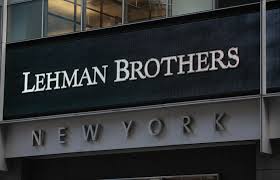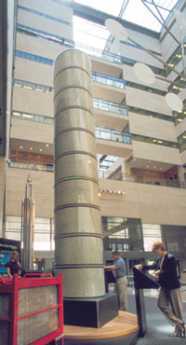Related Topics
American Finance After Robert Morris
Robert Morris can be fairly said to have made the American Revolution possible.
Whither, Federal Reserve? (2)After Our Crash
Whither, Federal Reserve? (2)
Federal Reserve Rolls the Dice

|
| Lehman Brothers |
For the year preceding, it was general opinion that the financial crisis was caused by $100 billion or so of mortgage-backed securities, mostly California and Florida home mortgages. But around Labor Day 2008 Lehman Brothers collapsed, and the problem became twenty times as large. What that was about is unclear, but seemingly had to do with money market funds being treated as "funds in transit" in consequence of the international monetary agreement known as Basel I, and thus not requiring bank reserves to be maintained for them. It will take time to unravel the intricacies of, and assign the blame for, this mess. However, the markets responded by refusing to trade at now uncertain prices, thus "freezing up". The response of the Federal Reserve was to double the money supply through international markets, mostly using "Central Bank liquidity swaps". The participation of various countries in this action has not been made public.
The doubling of the money supply required borrowing between one and two trillion dollars. After five months, or just after the inauguration of the new Presidential Administration, the markets had seemingly started to function more normally, and the stock market had rallied somewhat. The obviously bewildered leadership of both political parties agreed to the proposal to purchase $1.75 trillion of the troublesome assets, taking them off the market and presumably hoping the markets would function as if they did not exist. By July 2009 this operation was only about half completed. Not only was there disagreement about what these securities were really worth, but the banks which held them were reluctant to allow prices of what they continued to hold to be driven down by comparison with these forced transactions.

|
| Federal Reserve Bank of Philadelphia |
In any event, the second stage of this huge government bailout of the banking system is projected as follows: The portfolio of assets would be worn down, either by allowing debts to mature, or by selling them at what is hoped will be advantageous prices. Who will buy them is to some extent dependent on the state of the economy, and to some extent on the perception of the fairness of the pricing. The Federal Reserve Bank of St. Louis has been assigned the task of designing a public formula for how much to buy or sell, depending on selected indicators of the economy. A public formula is felt to be necessary in order to reassure the markets that purchases and sales are not being made in response to secret information or unsuspected problems.
The reasoning would be that if these assets are sold to speculators at fire-sale prices, the money supply will shrink inappropriately, and the recession will be prolonged by the need to borrow replacement reserves for the monetary system. Unduly profitable sales would probably lead to inflation, since the present level of monetary reserves is twice as large as was thought appropriate, as recently as a year or two ago. But this maneuver by a central bank has never been tried before, and the results may well differ from present predictions. The Federal Reserve is prepared to take as long as ten years to accomplish the complete maneuver, but that plan presumes ten years of recession and five congressional elections. It also implies that the economy could swing between 7% annual inflation, and 7% annual deflation, in the two worst cases, and assuming nothing extraneous happens to the economy.

|
| President Barack Obama |
In the meantime, two other ominous notes. Although the nationalities of the lenders have not been made public, one can safely assume the Chinese are a major component. Since they are refusing to lend us money beyond two, and at the most five, years, we would be indefinitely in the position of borrowing short and lending long. In other situations, that imposes a risk of depositors starting a run on the bank. And secondly, it is hard to imagine that Mr. Obama's presently ambitious programs in healthcare, environmental protection, two wars and several election cycles, will be allowed to proceed without enormous public resistance to even further fiscal deficits.
Originally published: Friday, July 03, 2009; most-recently modified: Sunday, July 21, 2019